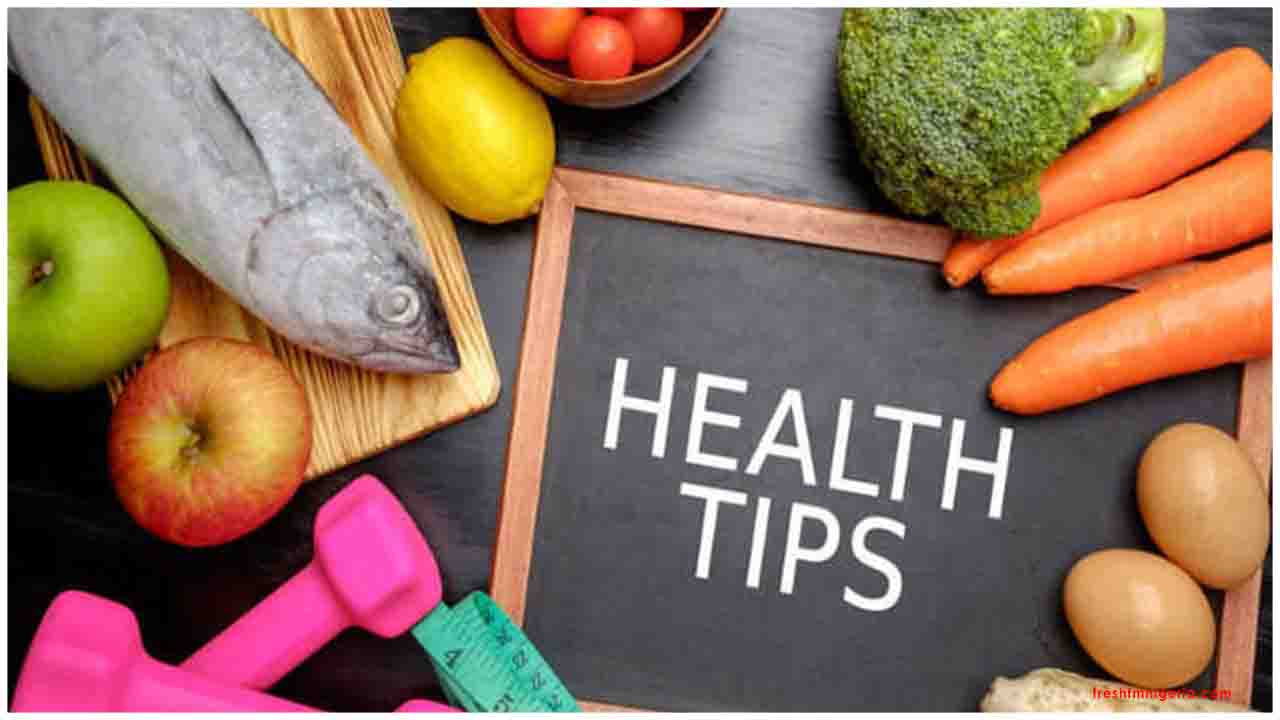The start of a new decade brings with it new resolutions to improve one’s life, including a healthier lifestyle. Here are 20 practical health tips to help you start off towards healthy living in 2020 - 21.
Eat a healthy diet
Eat a combination of different foods, including fruit, vegetables, legumes, nuts, and whole grains. Adults should eat at least five portions (400g) of fruit and vegetables per day. You can improve your intake of fruits and vegetables by always including veggies in your meal; eating fresh fruit and vegetables as snacks; eating a variety of fruits and vegetables, and eating them in season. By eating healthy, you will reduce your risk of malnutrition and non-communicable diseases (NCDs) such as diabetes, heart disease, stroke, and cancer.
Consume less salt and sugar
Most people get their sodium through salt. Reduce your salt intake to 5g per day, equivalent to about one teaspoon. It’s easier to do this by limiting the amount of salt, soy sauce, fish sauce, and other high-sodium condiments when preparing meals; removing salt, seasonings, and condiments from your meal table; avoiding salty snacks; and choosing low-sodium products. On the other hand, consuming excessive amounts of sugars increases the risk of tooth decay and unhealthy weight gain.
Reduce the intake of harmful fats
Fats consumed should be less than 30% of your total energy intake. This will help prevent unhealthy weight gain. There are different types of fats, but WHO recommends reducing saturated fats to less than 10% of total energy intake; reducing trans-fats to less than 1% of total energy intake; and replacing both saturated fats and trans-fats to unsaturated fats, such as frozen pizza, cookies, biscuits, and cooking oils and spreads.
Avoid the harmful use of alcohol
There is no safe level for drinking alcohol. Consuming alcohol can lead to health problems such as mental and behavioral disorders, including alcohol dependence, major NCDs such as liver cirrhosis, some cancers and heart diseases, as well as injuries resulting from violence and road clashes and collisions.
Don’t smoke
Smoking tobacco causes NCDs such as lung disease, heart disease, and stroke. Tobacco kills not only direct smokers but even non-smokers through second-hand exposure. Currently, there are around 15.9 million Filipino adults who smoke tobacco but 7 in 10 smokers are interested or plan to quit.
Be active
Physical activity is defined as any bodily movement produced by skeletal muscles that require energy expenditure. This includes exercise and activities undertaken while working, playing, carrying out household chores, traveling, and engaging in recreational pursuits.
Check your blood pressure regularly
Hypertension, or high blood pressure, is called a “silent killer”. This is because many people who have hypertension may not be aware of the problem as it may not have any symptoms. If left uncontrolled, hypertension can lead to heart, brain, kidney, and other diseases. Have your blood pressure checked regularly by a health worker so you know your numbers. If your blood pressure is high, get the advice of a health worker. This is vital in the prevention and control of hypertension.
Get tested
Getting yourself tested is an important step in knowing your health status, especially when it comes to HIV, hepatitis B, sexually-transmitted infections (STIs), and tuberculosis (TB). Left untreated, these diseases can lead to serious complications and even death. Knowing your status means you will know how to either continue preventing these diseases or, if you find out that you’re positive, get the care and treatment that you need. Go to a public or private health facility, wherever you are comfortable, to have yourself tested.
Get vaccinated
Vaccination is one of the most effective ways to prevent diseases. Vaccines work with your body’s natural defenses to build protection against diseases like cervical cancer, cholera, diphtheria, hepatitis B, influenza, measles, mumps, pneumonia, polio, rabies, rubella, tetanus, typhoid, and yellow fever.
Cover your mouth when coughing or sneezing
Diseases such as influenza, pneumonia, and tuberculosis are transmitted through the air. When you feel a cough or sneeze coming on, make sure you have covered your mouth with a face mask or use a tissue then dispose of it carefully. If you do not have a tissue close by when you cough or sneeze, cover your mouth as much as possible with the crook (or the inside) of your elbow.
Prevent mosquito bites
Mosquitoes are one of the deadliest animals in the world. Diseases like dengue, chikungunya, malaria, and lymphatic filariasis are transmitted by mosquitoes. You can take simple measures to protect yourself and your loved ones against mosquito-borne diseases. Wear light-colored, long-sleeved shirts and pants and use insect repellent. At home, use window and door screens, use bed nets, and clean your surroundings weekly to destroy mosquito breeding sites.
Drink only safe water
Drinking unsafe water can lead to water-borne diseases such as cholera, diarrhea, hepatitis A, typhoid, and polio. Globally, at least 2 billion people use a drinking water source contaminated with feces. In a setting where you are unsure of your water source, boil your water for at least one minute. This will destroy harmful organisms in the water. Let it cool naturally before drinking.
Breastfeed babies from 0 to 2 years and beyond
Breastfeeding is the best way to provide the ideal food for newborns and infants. WHO recommends that mothers initiate breastfeeding within one hour of birth. Breastfeeding for the first six months is crucial for the baby to grow up healthy. It is recommended that breastfeeding is continued for up to two years and beyond. Aside from being beneficial to babies, breastfeeding is also good for the mother as it reduces the risk of breast and ovarian cancer, type II diabetes, and postpartum depression.
Talk to someone you trust if you're feeling down
Depression is a common illness worldwide with over 260 million people affected. Depression can manifest in different ways, but it might make you feel hopeless or worthless, or you might think about negative and disturbing thoughts a lot or have an overwhelming sense of pain. If you’re going through this, remember that you are not alone. Talk to someone you trust such as a family member, friend, colleague, or mental health professional about how you feel.
Take antibiotics only as prescribed
Antibiotic resistance is one of the biggest public health threats in our generation. When antibiotics lose their power, bacterial infections become harder to treat, leading to higher medical costs, prolonged hospital stays, and increased mortality. Antibiotics are losing their power because of misuse and overuse in humans and animals. Make sure you only take antibiotics if prescribed by a qualified health professional. And once prescribed, complete the treatment days as instructed. Never share antibiotics.
Clean your hands properly
Hand hygiene is critical not only for health workers but for everyone. Clean hands can prevent the spread of infectious illnesses. You should hand wash using soap and water when your hands are visibly soiled or hand rub using an alcohol-based product.
Prepare your food correctly
Unsafe food containing harmful bacteria, viruses, parasites, or chemical substances, causes more than 200 diseases – ranging from diarrhea to cancers. When buying food at the market or store, check the labels or the actual product to ensure it is safe to eat.
Have regular check-ups
Regular check-ups can help find health problems before they start. Health professionals can help find and diagnose health issues early when your chances for treatment and cure are better. Go to your nearest health facility to check out the health services, screenings, and treatments that are accessible to you.
References:
https://www.who.int/philippines/news/feature-stories/detail/20-health-tips-for-2020

 Unsafe food containing harmful bacteria, viruses, parasites, or chemical substances, causes more than 200 diseases – ranging from diarrhea to cancers.
Unsafe food containing harmful bacteria, viruses, parasites, or chemical substances, causes more than 200 diseases – ranging from diarrhea to cancers.


























.jpg)





